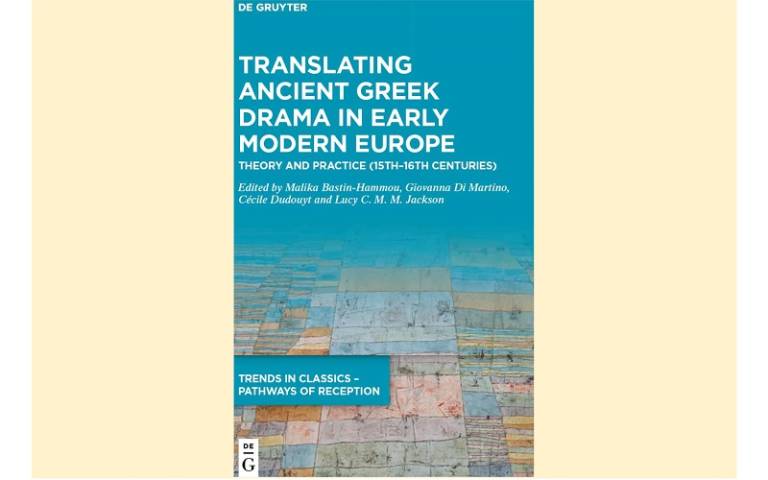Book Launch: Translating Ancient Greek Drama in Early Modern Europe (15th-16th Centuries)
13 June 2023, 4:00 pm–6:00 pm

Whilst studies of the reception of ancient Greek drama in this period have generally focused on one national tradition, this book widens the geographical and linguistic scope so as to approach it as a European phenomenon.
This event is free.
Event Information
Open to
- All | UCL staff | UCL students
Availability
- Yes
Cost
- Free
Organiser
-
Giovanna Di Martino
Location
-
IAS ForumG17, Ground Floor, South Wing Wilkins BuildingLondonWC1E 6BTUnited Kingdom
Edited by Malika Bastin-Hammou, Giovanna Di Martino, Cécile Dudouyt and Lucy C. M. M. Jackson Trends in Classics – Pathways of Reception, De Gruyter: Berlin
Presentation by the editors Malika Bastin-Hammou (Grenoble), Giovanna Di Martino (UCL), Cécile Dudouyt (Paris 13), Lucy Jackson (Durham), followed by a response from Fiona Macintosh (Oxford, Director of APGRD) and Sarah Knight (Leicester).
Celebratory drinks to follow!
The event is free but registration is required, please register here.
Description of the volume:
The volume brings together contributions on 15th and 16th century translation throughout Europe (in particular Italy, France, Spain, Portugal, Germany, and England).
Whilst studies of the reception of ancient Greek drama in this period have generally focused on one national tradition, this book widens the geographical and linguistic scope so as to approach it as a European phenomenon. Latin translations are particularly emblematic of this broader scope: translators from all over Europe latinised Greek drama and, as they did so, developed networks of translators and practices of translation that could transcend national borders. The chapters collected here demonstrate that translation theory and practice did not develop in national isolation, but were part of a larger European phenomenon, nourished by common references to Biblical and Greco-Roman antiquities, and honed by common religious and scholarly controversies. In addition to situating these texts in the wider context of the reception of Greek drama in the early modern period, this volume opens avenues for theoretical debate about translation practices and discourses on translation, and on how they map on to twenty-first-century terminology.
About the Respondents:
Fiona Macintosh is Professor of Classical Reception, Director of the Archive of Performances of Greek and Roman Drama (APGRD) and Fellow of St Hilda’s College, University of Oxford. She is the author of Dying Acts (1994), Greek Tragedy and the British Theatre 1660-1914 (2005 - with Edith Hall), Sophocles’ Oedipus Tyrannus (2009), and Performing Epic or Telling Tales (2020 - with Justine McConnell). She has edited nine APGRD volumes: Medea in Performance (2000), Dionysus Since 69 (2004), Agamemnon in Performance 458BC-AD 2005 (2005), The Ancient Dancer in the Modern World (2010), Choruses, Ancient and Modern (2012), The Oxford Handbook of Greek Drama in the Americas (2015), Epic Performances from the middle ages into the twenty-first century (2018) and Heaney and the Classics (2019). Mapping Medea: Revolutions, Transfers 1750-1800, co-edited with Anna Albrektson, will appear with Oxford University Press in 2023.
Sarah Knight is Professor of Renaissance Literature in the School of Arts, University of Leicester. Professor Knight has edited and translated several early modern works, including Leon Battista Alberti’s Momus (I Tatti 2003) and the accounts of Elizabeth I’s visits to Oxford for the five-volume critical edition of John Nichols’s Progresses (Oxford University Press, 2014). She has co-edited essay collections on the European contexts of Ramism, the Elizabethan Progresses, and the early modern Inns of Court, as well as The Oxford Handbook of Neo-Latin, and has published widely on works written at or about institutions of learning (schools, universities, Inns of Court), especially the associations between poetic and rhetorical composition and educational experience. Her two current research projects are an edition and translation of John Milton’s student Latin speeches (the Prolusiones) and his Latin letters (the Epistolae Familiares); and an edition of Fulke Greville’s two tragedies Alaham and Mustapha.
 Close
Close

